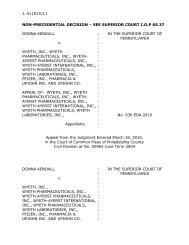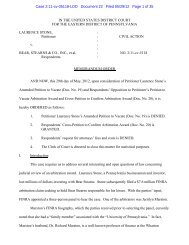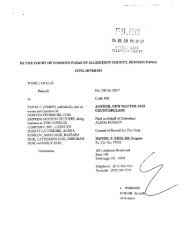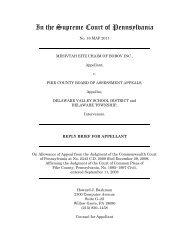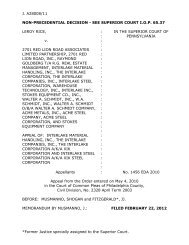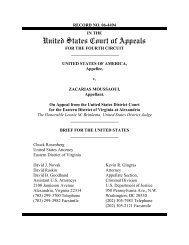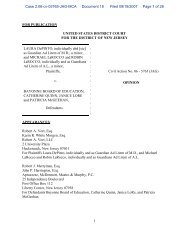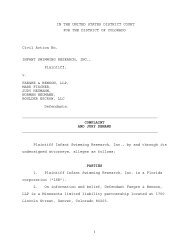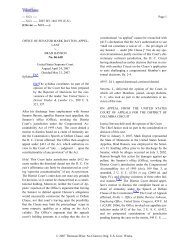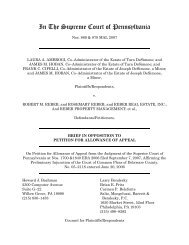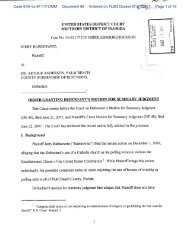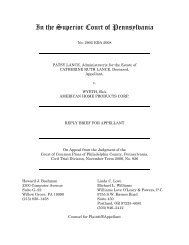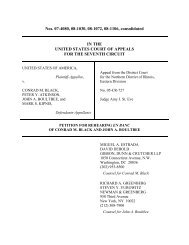In the Superior Court of Pennsylvania - How Appealing
In the Superior Court of Pennsylvania - How Appealing
In the Superior Court of Pennsylvania - How Appealing
You also want an ePaper? Increase the reach of your titles
YUMPU automatically turns print PDFs into web optimized ePapers that Google loves.
which this <strong>Court</strong> has described as “a judicially created device which tolls <strong>the</strong><br />
running <strong>of</strong> <strong>the</strong> applicable statute <strong>of</strong> limitations until <strong>the</strong> point where <strong>the</strong><br />
complaining party knows or reasonably should know that he has been injured and<br />
that his injury has been caused by ano<strong>the</strong>r party’s conduct.” Id. at 404, 745 A.2d at<br />
611.<br />
<strong>In</strong> Fine, this <strong>Court</strong>’s unanimous opinion addressed <strong>the</strong> role <strong>of</strong> <strong>the</strong> trial judge<br />
and <strong>the</strong> jury in applying <strong>the</strong> discovery rule:<br />
[W]hen a court is presented with <strong>the</strong> assertion <strong>of</strong> <strong>the</strong> discovery<br />
rule’s application, it must address <strong>the</strong> ability <strong>of</strong> <strong>the</strong> damaged party,<br />
exercising reasonable diligence, to ascertain that he has been injured<br />
and by what cause. Since this question involves a factual<br />
determination as to whe<strong>the</strong>r a party was able, in <strong>the</strong> exercise <strong>of</strong><br />
reasonable diligence, to know <strong>of</strong> his injury and its cause, ordinarily, a<br />
jury is to decide it. * * *<br />
When <strong>the</strong> discovery rule applies, <strong>the</strong> statute <strong>of</strong> limitations does<br />
not commence to run at <strong>the</strong> instant that <strong>the</strong> right to institute suit<br />
arises, i.e., when <strong>the</strong> injury occurs. Ra<strong>the</strong>r, <strong>the</strong> statute is tolled, and<br />
does not begin to run until <strong>the</strong> injured party discovers or reasonably<br />
should discover that he has been injured and that his injury has been<br />
caused by ano<strong>the</strong>r party’s conduct. Whe<strong>the</strong>r <strong>the</strong> statute <strong>of</strong> limitations<br />
has run on a claim is a question <strong>of</strong> law for <strong>the</strong> trial court to determine;<br />
but <strong>the</strong> question as to when a party’s injury and its cause were<br />
discovered or discoverable is for <strong>the</strong> jury.<br />
Fine, 582 Pa. at 267–68, 870 A.2d at 858–59 (emphasis added).<br />
When a person is injured and knows that his injury resulted from ano<strong>the</strong>r<br />
party’s conduct, <strong>the</strong> statute <strong>of</strong> limitations begins to run at <strong>the</strong> time <strong>the</strong> injury<br />
occurred. <strong>How</strong>ever, if a person is unaware <strong>of</strong> <strong>the</strong> injury or <strong>of</strong> <strong>the</strong> fact that <strong>the</strong> injury<br />
was caused by ano<strong>the</strong>r party’s conduct, <strong>the</strong> “discovery rule” applies. The statute <strong>of</strong><br />
limitations does not begin to run “until <strong>the</strong> point where <strong>the</strong> complaining party<br />
– 24 –



